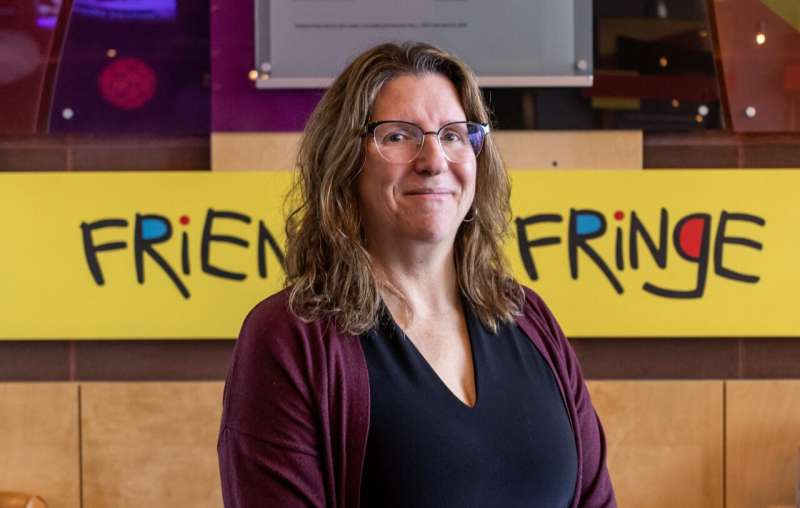‘Think of the whole child, not just their ears’

There is a fierce debate raging in the deaf community.
Many audiologists believe sign language is obsolete, recommending instead that deaf children rely exclusively on technology such as cochlear implants and hearing aids. Sign language, they contend, interferes with learning to speak.
Joanne Weber argues the whole dispute is absurd and unnecessary. The first Canada Research Chair in deaf education says options shouldn’t be reduced to either/or. Having spent years teaching deaf children, she is convinced that the more tools for expression—and the greater the exposure to any kind of language—the better.
As chair she plans to provide a blueprint for deaf education that gives children every advantage possible, drawing on the arts to improve their language fluency.
“It’s just part of the culture that sign language is to be avoided if your child is deaf, and some clinics are adamant children not use it,” says Weber, assisted by American Sign Language interpreter Tracy Hetman.
It’s a misguided way of thinking, she said, only exacerbating the widespread problems of language deprivation—or the lack of linguistic stimuli necessary for language acquisition—especially during the critical period of language development in early childhood.
Language deprivation is severe among deaf children, says Weber, restricting academic performance and social and emotional development—even among those with cochlear implants or hearing aids who also sign. The average reading level for many deaf high school graduates is Grade 4, Weber notes.
“You’re providing all this money towards technology and equipment, and it doesn’t solve the problem at all.”
One way technology could play a helpful role in deaf education is through open access to electronic books for both teachers and learners—something Weber is now exploring. The main problem, she says, is that all too often deaf students aren’t exposed consistently to any language, only bits and pieces of it, so that the brain is unable to form anything cohesive.
“When they graduate from high school, many can’t read or write, can’t really go on to post-secondary education. They basically have nowhere to go because the system failed them.”
Learning to both sign and speak with the help of hearing devices provides the best foundation for language acquisition, says Weber. But she believes the arts can provide a pathway to increased fluency, creating opportunities for expression and exchange.
Her Ph.D. research examined how arts-based instruction improved students’ awareness of phonology, morphology, linguistics, literary conventions and overall communicative competence. As Canada Research Chair, she is applying her approach to language acquisition through the arts with students at the Alberta School for the Deaf.
Since 2016, she has also run a theater company called the Deaf Crows Collective, providing opportunities for deaf, hard of hearing, hearing and late-deafened actors of all ages to celebrate deaf culture, she says, encouraging self expression and fostering relationships between hearing and deaf communities.
“Most of them were hard of hearing, but their language deprivation was quite profound. Even those who could speak couldn’t read or write very well.
“When we got them involved in the arts it really changed their brains. They noticed how they got better. The parents said that, for the first time, they felt their child could actually succeed in the world.”
Deaf actor Troy Kotsur echoed these sentiments in his recent acceptance speech for his Oscar-winning performance in Coda, paying tribute to “the wonderful deaf theater stages where I was allowed and given the opportunity to develop my craft as an actor.”
Weber, who was appointed to her Canada Research Chair without a pre-existing academic affiliation, is widely recognized for her contribution to deaf education, having published a number of articles on the subject drawn from her Governor General’s Gold Medal-winning thesis from the University of Regina.
She was informed of the chair position by U of A dean of education Jennifer Tupper while working as a teacher in a Saskatchewan high school. It was created as part of the federal government’s Accessible Canada Act in 2019, which also recognized American Sign Language. Weber took up her post in 2022.
“I’m the only professor in academia working on deaf education, so the capacity has to be developed,” says Weber.
“We need more people out there to get the message out. I want people to think in a different way about the actual impacts on the child, and to think of the whole child, not just their ears. They’re a whole being.”
Citation:
‘Think of the whole child, not just their ears’ (2022, May 9)
retrieved 9 May 2022
from https://phys.org/news/2022-05-child-ears.html
This document is subject to copyright. Apart from any fair dealing for the purpose of private study or research, no
part may be reproduced without the written permission. The content is provided for information purposes only.
For all the latest Science News Click Here
For the latest news and updates, follow us on Google News.

